After withdrawing forces from the northern front, leaving dozens of towns around Kyiv in ruins, Russia has turned its sights toward Donbas. As the Russian troops advance, many towns on the front have turned cold and hungry, echoing to exploding shells and bursts of gunfire. Although fighting is widespread across Ukraine, according to the UN, the most intense battles and highest civilian casualty rates are in the East. As the hostilities intensify, contact with towns on or near the front is becoming increasingly difficult. Civilians are being asked to leave as the atrocities carried out in Ukrainian towns under the control of Moscow’s troops – including allegations of rape, torture, and executions – give a potential Eastern invasion a new dire perspective.
Last Trains From Donbas: “This the most difficult thing we have decided on, but after what happened around Kyiv we are taking no chances”
On the 29th of March, their home in Avdiivka got hit by a phosphor shell. After two weeks without a place to stay, Lenca with her three children Stasik, Aurika, Nastha, and her granddaughter Angelika decided to leave their town in search of a new life: “I don’t even know where we are going. We have decided this morning. The administration said that this might be our last chance to leave.” Each of them has nothing but a school-sized backpack and some plastic bags filled with clothes. They are waiting with a few other people for a bus that will take them to Pokrovsk, where they can take the evacuation train further west. The atmosphere feels heavy – tense. The smell of gunpowder lingers in the air. People are quiet, smoking, and besides occasional metal thunder from the nearby frontline, the street remains silent.
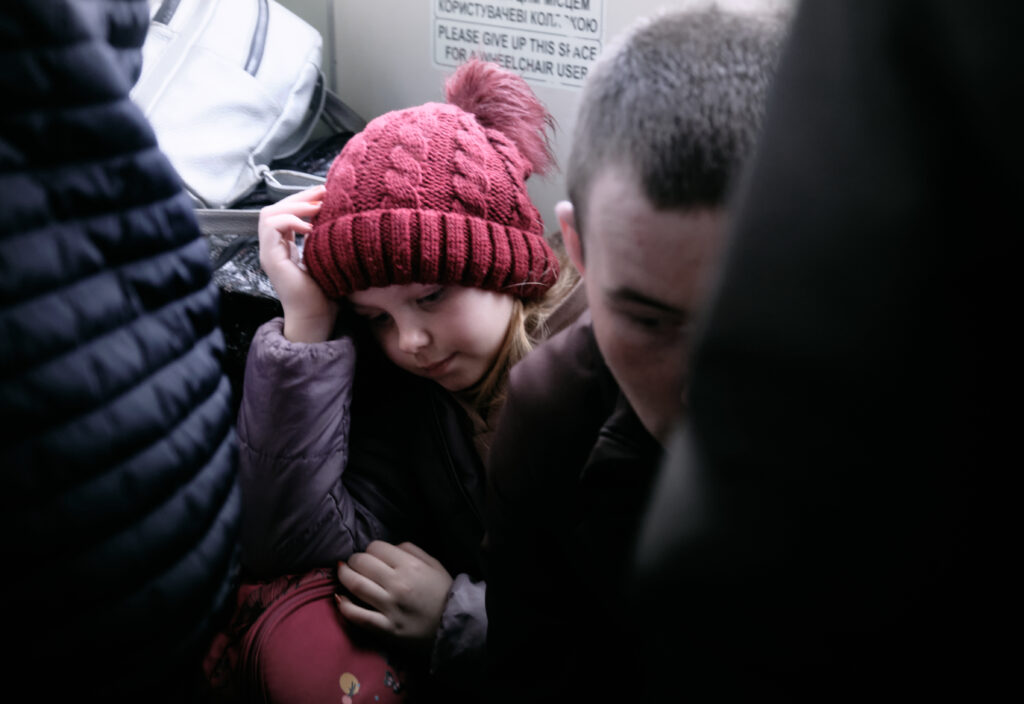
On the train, the family agrees that they will go to Dnipro. Aurika asks: “Where we will go once we get to Dnipro?” Her mother, Lenca answers in a tired voice: “I guess, we will stand and wait till God helps. If there are going to be no explosions, we will be in heaven, don’t you think?” They hope they might meet someone from their town who fled there too, but they have not managed to get in touch with anyone yet. Stasik, still a child but also the oldest man in the family, searches on his phone: ‘work in Dnipro,’ but with no luck. Infrastructure in the East of Ukraine has been decimated and with it most avenues of income. The train keeps passing buildings damaged by artillery fire and the mood in the coupe does not improve. After a few hours when the train approaches Dnipro, Angelika starts crying: “I don’t want Dnipro. I want home.” Minutes later she falls asleep exhausted on Lenca’s shoulder.
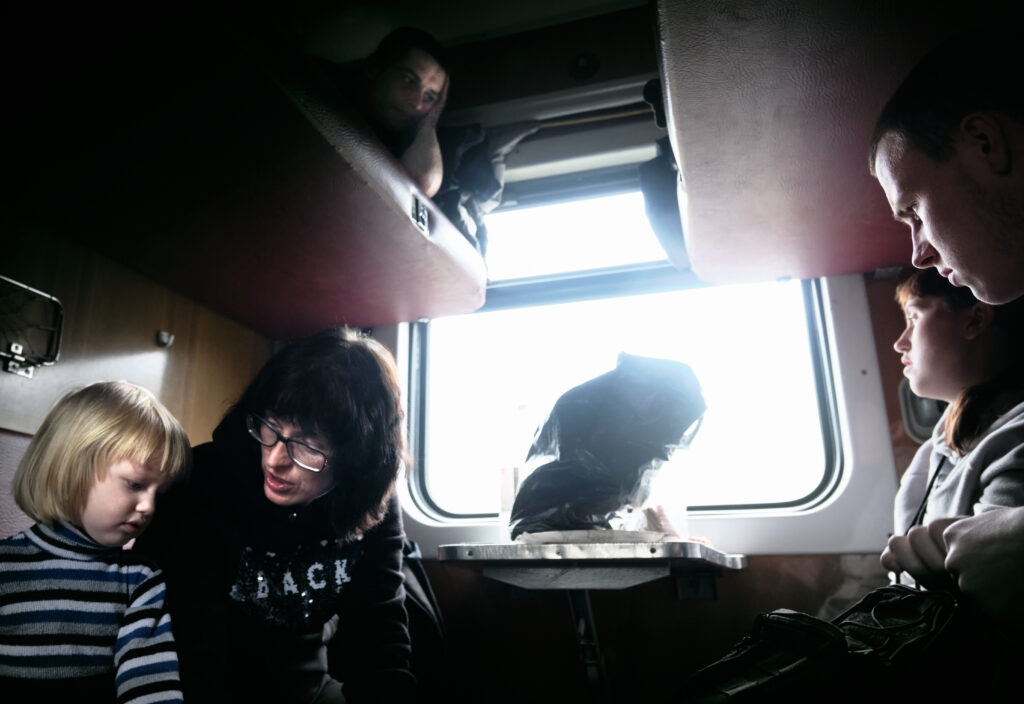
Every day, dozens of evacuation transports leave Donbas. However, the intensifying hostilities have made evacuation efforts increasingly difficult. Many people from the administration have fled, humanitarian agencies have withdrawn from the hot spots due to security concerns, and as the Russian troops advance, many of the previously safe evacuation routes have become too dangerous to use. The majority of the population currently seeking to evacuate are elderly with no savings left and as Lenca’s family is well aware: even after fleeing immediate danger, a bright new life is far from guaranteed. Although they have found at least some refuge in Dnipro for now, the city is depleted of resources after serving so many. They are living in a tent, with no work and no future to look for. “We have left with our eyes closed. Now, I worry we need to learn how to live like that. This is the most difficult thing we have decided on, but after what happened around Kyiv we are taking no chances,” Lenca says on the phone.
Those Who Remained: “I don’t want to think of what happens in towns under Russian occupation.”
Although thousands, including Lenca and her family, have fled Avdiivka, many remain in the town, cowering in their cellars. The Russian army is on their doorstep, but this is nothing new; they have been there for the last eight years. The Avdiivka frontline, just within view from the town, was and remains one of the most perilous battlegrounds since the war in Donbas began in 2014.
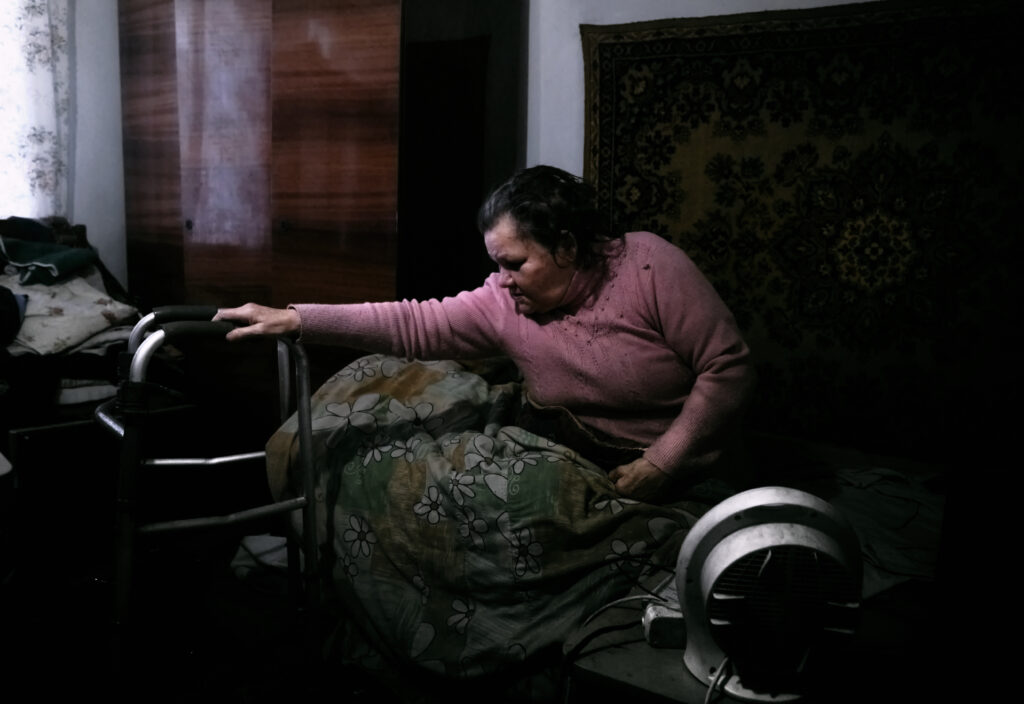
After some hope of a ceasefire in 2019 and 2020, the incoming barrage is once again not sporadic, but constant. Days are once again filled with flashes of exploding ammunition and the night sky is marked with traces of fire. Essential services have collapsed. People are once more sheltering in basements and cooking the little food they have over open fires. “We thought that Ukraine is going to see some peace… I was so naive,” mutters Sofia, as shells crackle above her in the streets.
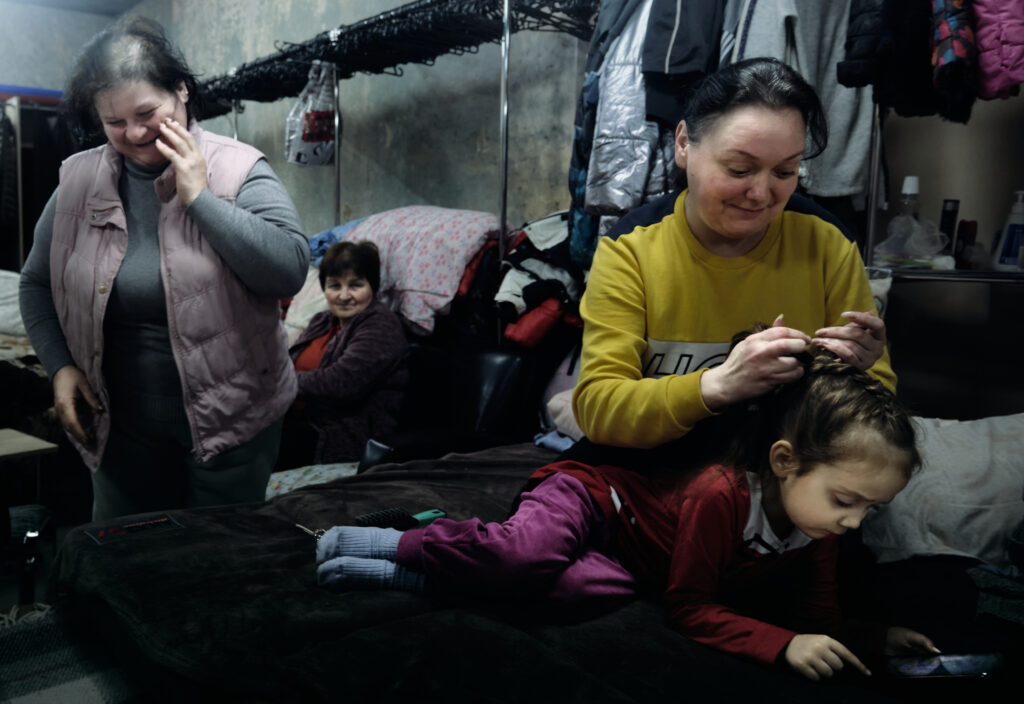
Sofia now lives with her son, Nazar, and daughter, Vila, in a basement with 24 other people, mostly the elderly and children. Most of them came here out of fear. “The shelling is terrifying. It is better when you can be with other people,” says Sonia.
The place is crammed with mattresses, with an utter lack of privacy. The air is stale, water slowly drips from the ceiling, and the walls are covered with a thick layer of turquoise-colored mold. Despite all this, in contrast to the ubiquitous anxiety present in the shelled streets, the shelter offers a warm and intimate atmosphere.
Children are laughing. People are snug on the mattresses covered under layers of blankets. After weeks of this life, everyone found their own way to entertain themselves. One lady is painting. A few of the grandpas play dominoes. A circle of grannies come together around a deck of cards. Nazar is learning to play the guitar and Vila impersonates a variety of characters in endless imaginary games with the other younger kids.
Despite the audible explosions from the surface, people chat about movies, friends, or pets, not of war. Sometimes the closer blows shake the walls, the light bulbs flicker, and then some twitch, gasp or start quietly praying to themselves, but then carry on.
At the end of the day, when all is said and done, they shut the lights and go to bed. Sofia has Nazar, who cuddles with his girlfriend, on one side and Vila on the other. She uses her headlamp to read a fairytale out loud. When she finishes there is silence, and all that’s left is the repetitive, clock-like precise soft throb from the explosions on the surface.
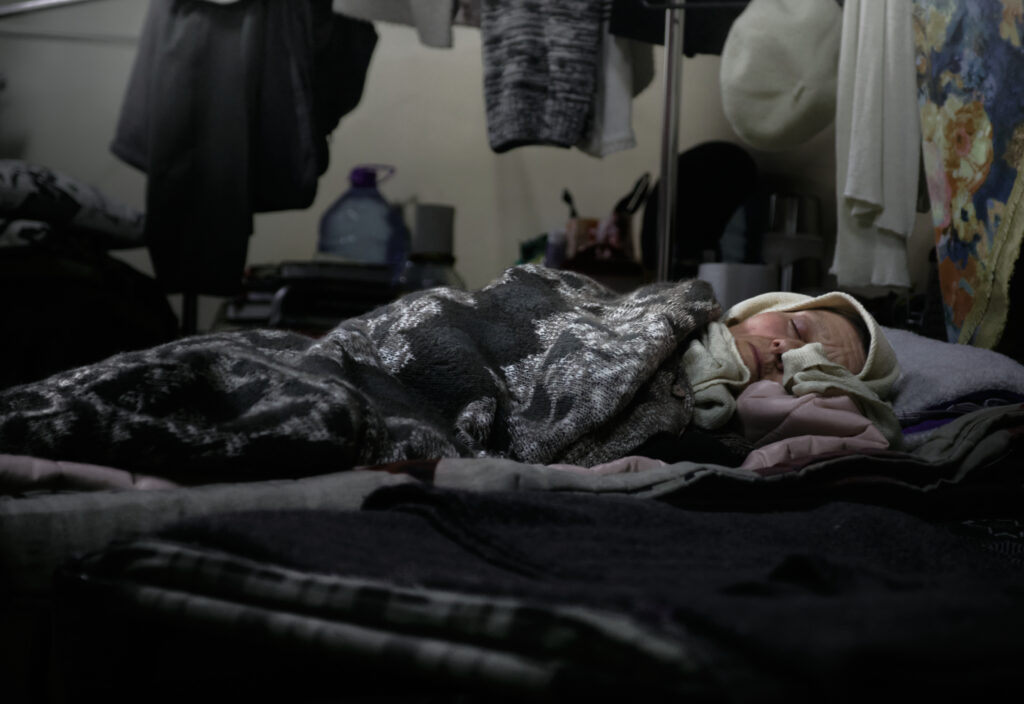
Around four in the morning, people are awakened by loud explosions from an airstrike. Those who cannot sleep stand on the staircase to the cellars and smoke. Sofia seems tired and stressed. “I am thinking of my kids,” she starts. “It feels fine for now. We got used to it. We lived here our whole life. Thirteenth of March, when our house got destroyed by grads, we were thinking of leaving but I am alone, my husband is dead and I don’t know where we would go. My father is here. My mother-in-law too, she is sick and neither of them wants to leave. To be honest, shelling is not the worst way to die,” her voice suddenly turns rough, like broken glass and cigarettes: “I don’t want to think of what happens in towns under Russian occupation. No, I don’t want to know what has happened there. I don’t want to imagine, that this might happen to my kids too.”
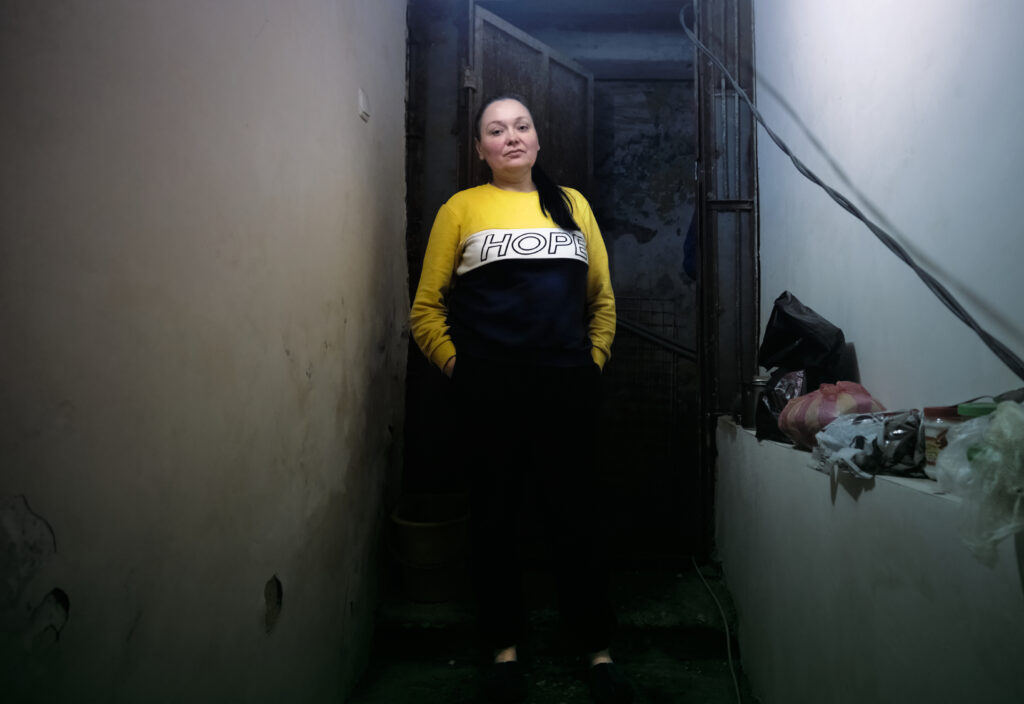
Uncovered Massacre in Suburbs of Kyiv and its Prospect in the East: “Russians have killed here for no reason. They will continue killing for no reason.”
While Lenca settles in Dnipro, and Sonia decides to stay in her hometown on the frontline, more bodies are pulled from mass graves, cellars, and rubble in Bucha and its surroundings. Mounting evidence of atrocities is spurring calls to hold Russia accountable, but even more importantly it is decisive information for those who might very soon share a very similar fate. Images from the streets of Kyiv’s suburbs are a tragic testament to the horrors of Russian occupation.
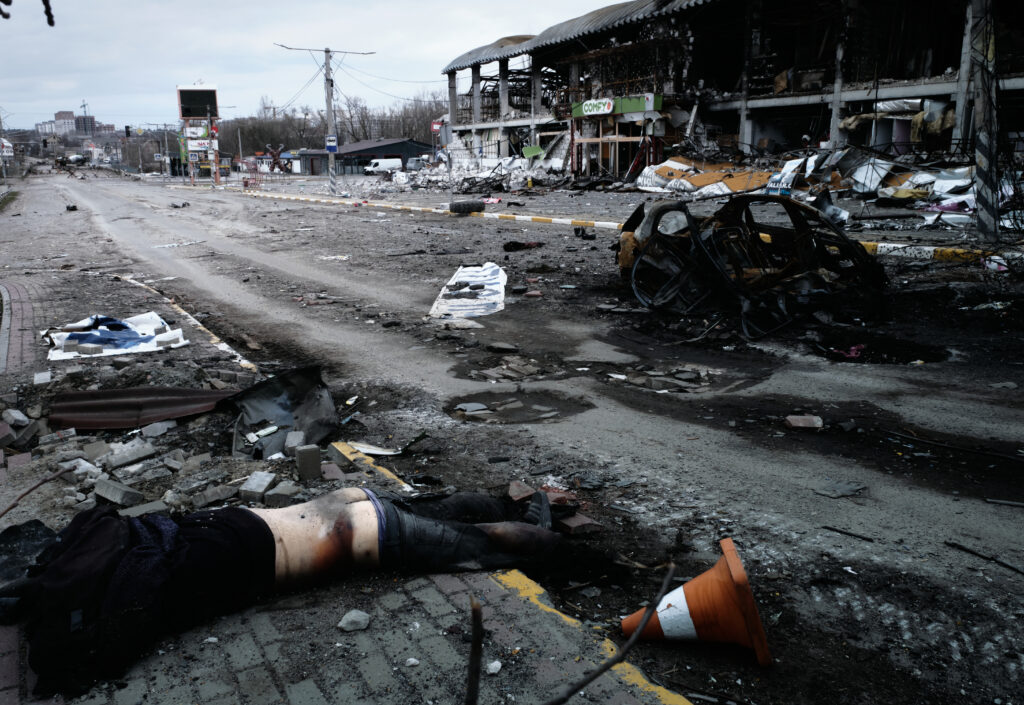
The dog barks hysterically as we approach the body of his owner. He struggles to drag him away in vain. Eventually, he resigns and the swollen hand drops motionless to the ground. The dog cries out one last time and then just quietly whines. Zhena, on his back, with a rug over his face, lies dead only a couple of meters from his house on a sidewalk in Bucha. His body must have been here for at least a few days now, but it still remains indignantly tossed between garbage on the street. His wife fled when she could. For now, there is no one to bury him. There is no one but the four-legged friend who still remains by his side.
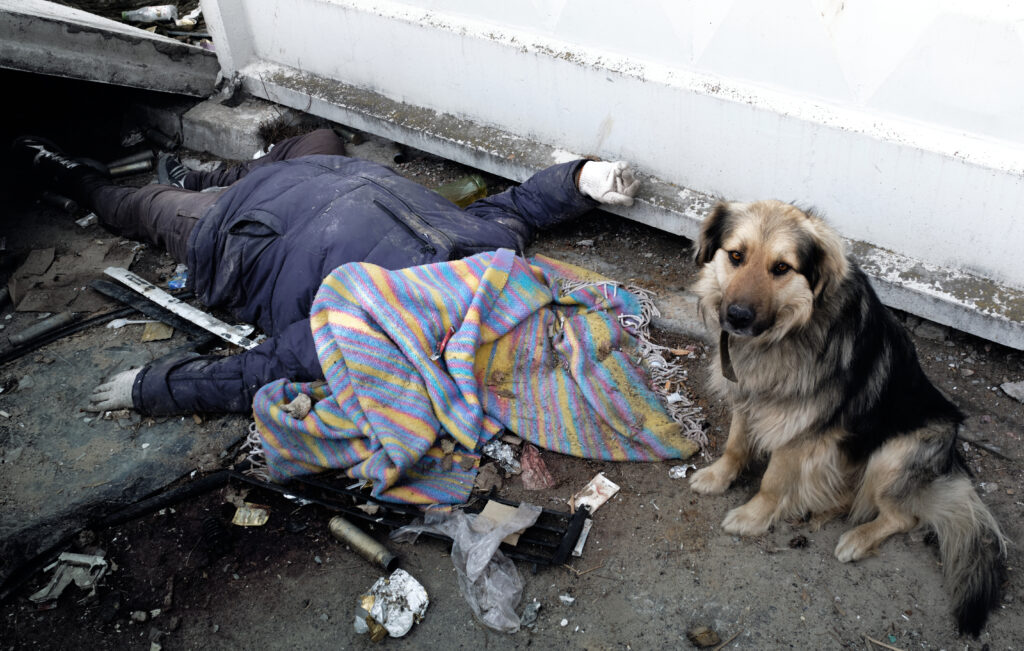
There are too many bodies in the streets and not enough hands to clear them away. Just around the corner from Zhena lies, face down, the body of an unidentified young man.
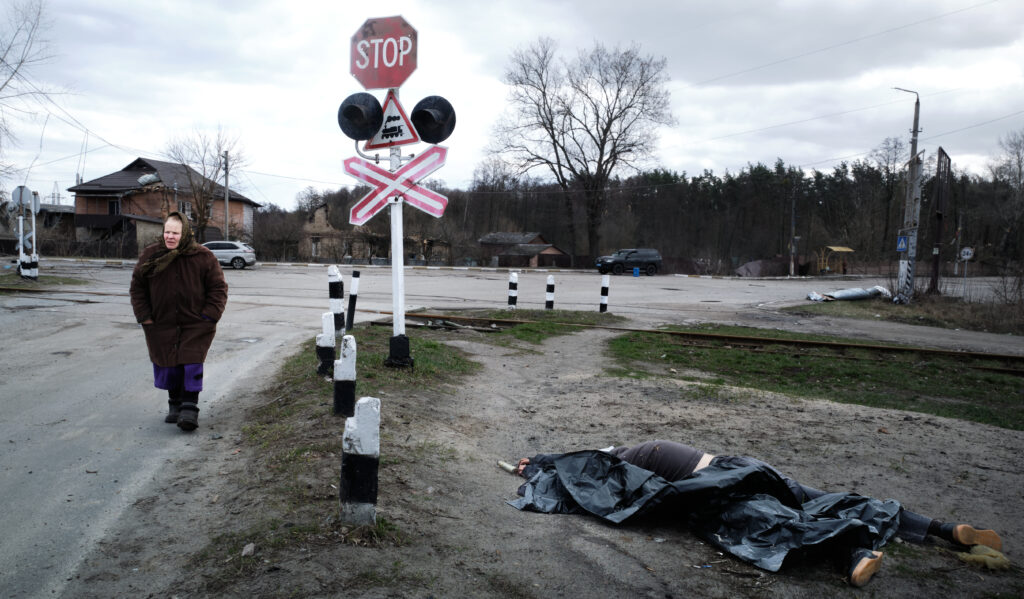
Someone has put a sheet of black plastic over the body but the wind blew it away and exposed parts of his remains to the elements. Covered in the dirt, his uncovered hands show the first signs of decay. His water-soaked fingers are turning blue. His fingernails are already purple.
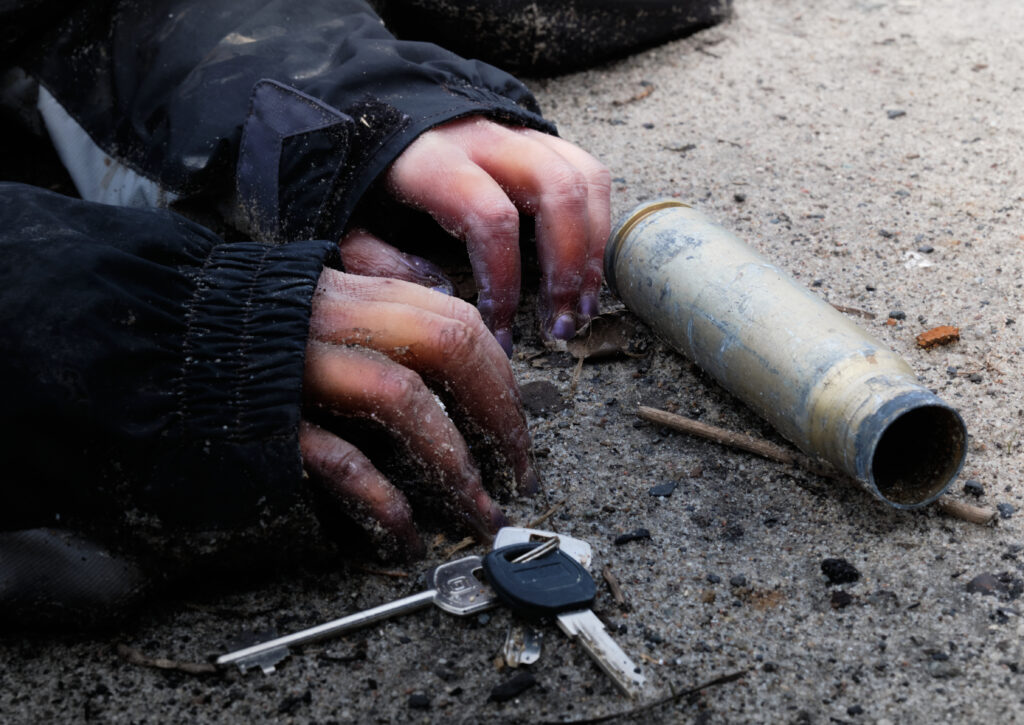
As it is again relatively safe to walk in the streets, those who remain are clearing up the bodies from the streets. The image of the dead can tell more than those who are still living. In Bucha, fifteen people were found shot in the head, hands tied, on one street alone. There is evidence of Russian soldiers tormenting and raping women and even children.
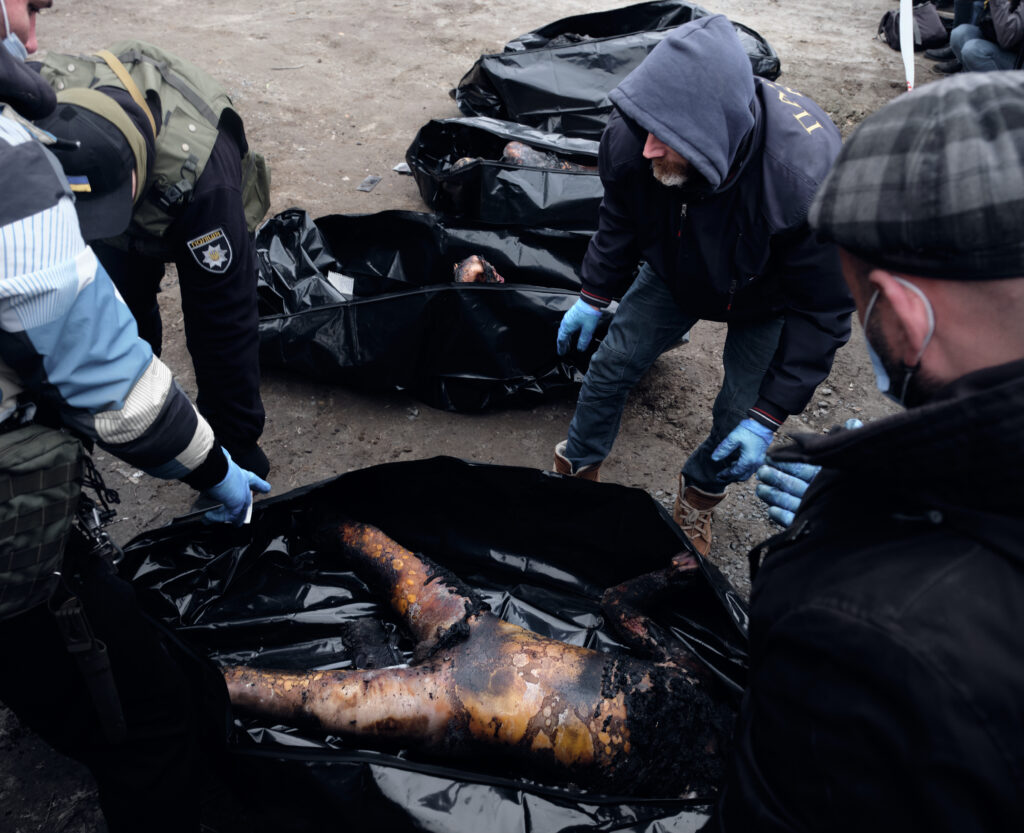
Russians piled the bodies of their victims and burned them to get rid of the evidence. Despite the taste of gasoline in the air, the stink of corpses lingers in every breath. It’s a cold smell, a heavy smell, painfully sharp and sickly-sweet. One blackened body has a bullet hole in the left temple. The limbs of another are deformed and twisted at unnatural angles. Four of them are adult women, two of them men, but there is also one small blackened foot of a child dangling from the pile. That’s fate of many of those who decided to stay.
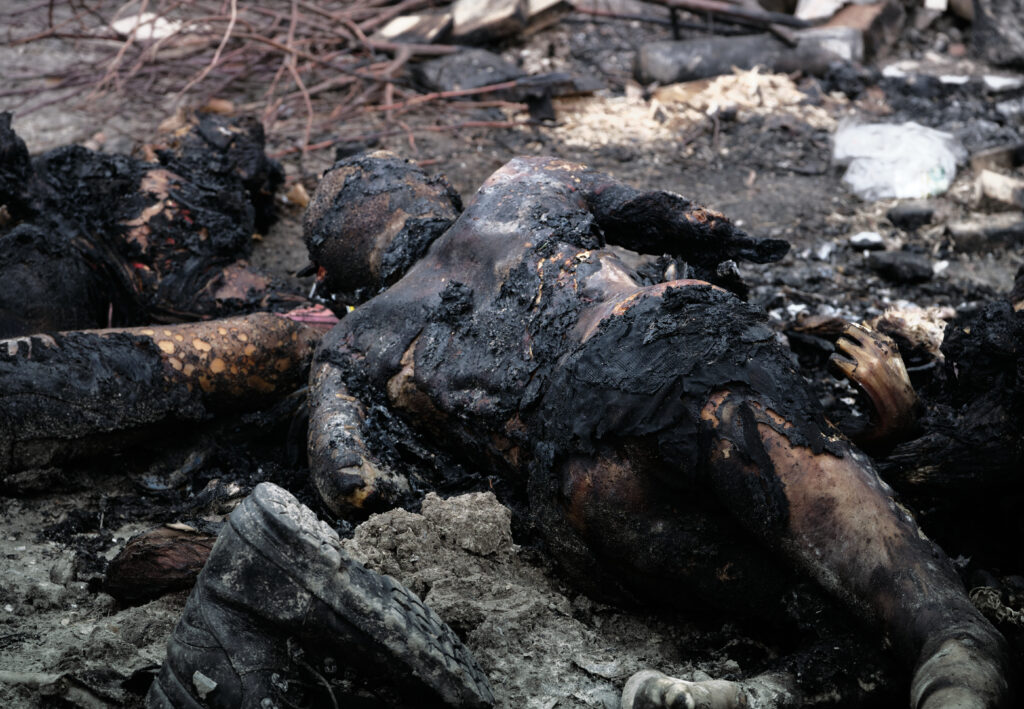
Sergey is one of the Ukrainians that did not flee his home in time and got trapped under Russian occupation. “I thought, I love my town and I thought, I would regret leaving. Now, I rather don’t go out of my house, because I don’t want to think of what happened in the streets.” He thinks that there must be hundreds of ‘Buchas’ in Ukraine. “Russians have killed here for no reason. They have beaten me up for no reason. They will continue killing for no reason.”
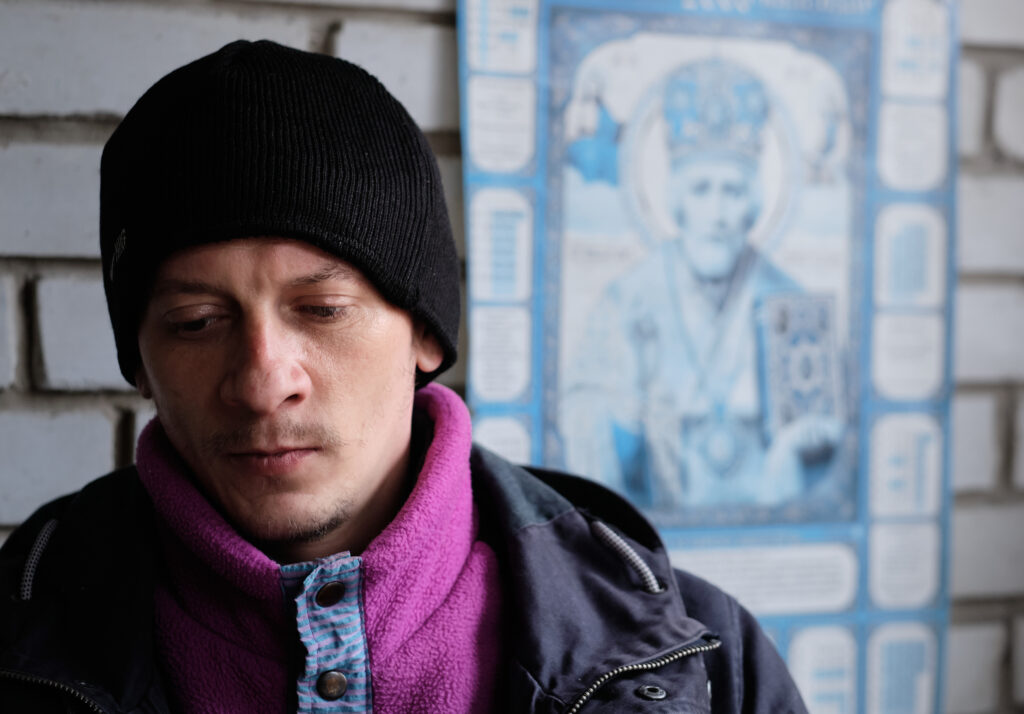
Sergey slowly pulls down his pants. “I was lucky,” he says. Even though the beating happened more than a week ago, the bruises are still apparent on various parts of his body.
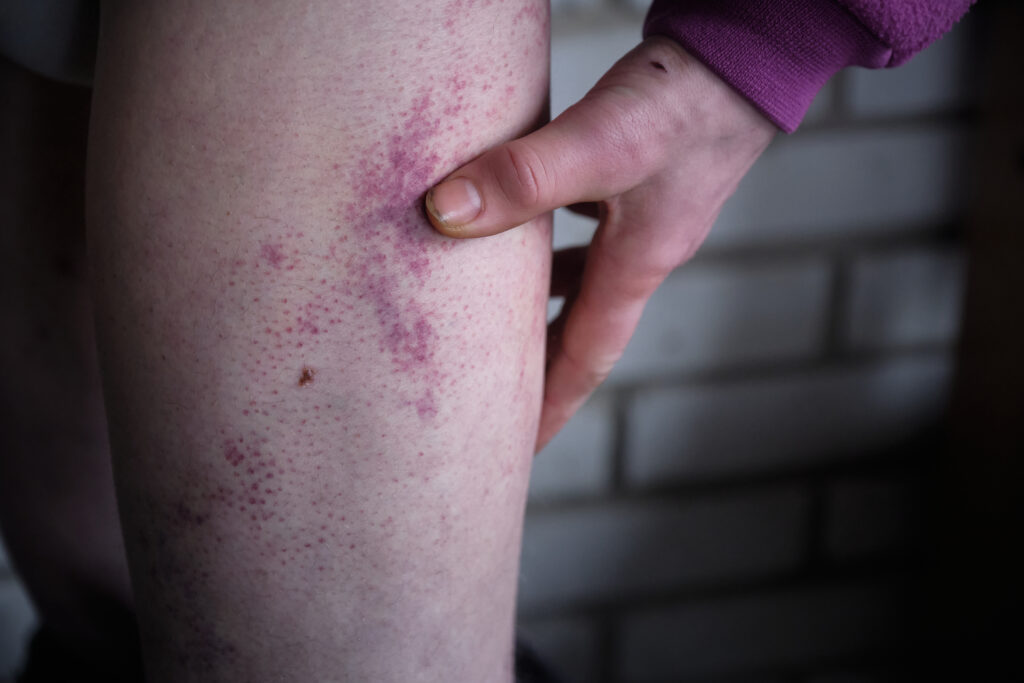
The fate of his town is not unique. Dozens of bodies were extracted from the rubble of residential buildings in the nearby town of Borodyanka. All around the area, locals recount random, unaccountable violence against civilians. As the Russian army diverts its efforts to the east of Ukraine, Bucha and its surrounding towns are a painful display of the suffering endured when the Russian army is allowed to realize its vision of a de-Ukrainized Ukraine. That’s the future from which Lenca’s family is fleeing and the possibility for Sonia and her children that decided to stay.
Photographs and text by Jakub Laichter
Instagram: _laichter